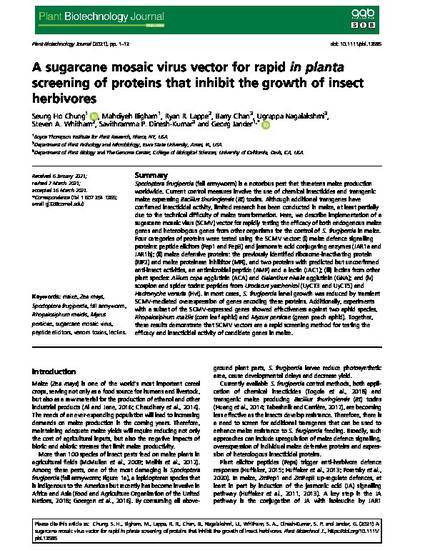
Spodoptera frugiperda (fall armyworm) is a notorious pest that threatens maize production worldwide. Current control measures involve the use of chemical insecticides and transgenic maize expressing Bacillus thuringiensis (Bt) toxins. Although additional transgenes have confirmed insecticidal activity, limited research has been conducted in maize, at least partially due to the technical difficulty of maize transformation. Here, we describe implementation of a sugarcane mosaic virus (SCMV) vector for rapidly testing the efficacy of both endogenous maize genes and heterologous genes from other organisms for the control of S. frugiperda in maize. Four categories of proteins were tested using the SCMV vector: (i) maize defence signalling proteins: peptide elicitors (Pep1 and Pep3) and jasmonate acid conjugating enzymes (JAR1a and JAR1b); (ii) maize defensive proteins: the previously identified ribosome‐inactivating protein (RIP2) and maize proteinase inhibitor (MPI), and two proteins with predicted but unconfirmed anti‐insect activities, an antimicrobial peptide (AMP) and a lectin (JAC1); (iii) lectins from other plant species: Allium cepa agglutinin (ACA) and Galanthus nivalis agglutinin (GNA); and (iv) scorpion and spider toxins: peptides from Urodacus yaschenkoi (UyCT3 and UyCT5) and Hadronyche versuta (Hvt). In most cases, S. frugiperda larval growth was reduced by transient SCMV‐mediated overexpression of genes encoding these proteins. Additionally, experiments with a subset of the SCMV‐expressed genes showed effectiveness against two aphid species, Rhopalosiphum maidis (corn leaf aphid) and Myzus persicae (green peach aphid). Together, these results demonstrate that SCMV vectors are a rapid screening method for testing the efficacy and insecticidal activity of candidate genes in maize.
Available at: http://works.bepress.com/steven-whitham/54/

This article is published as Chung, Seung Ho, Mahdiyeh Bigham, Ryan R. Lappe, Barry Chan, Ugrappa Nagalakshmi, Steven A. Whitham, Savithramma P. Dinesh‐Kumar, and Georg Jander. "A sugarcane mosaic virus vector for rapid in planta screening of proteins that inhibit the growth of insect herbivores." Plant Biotechnology Journal (2021). doi:10.1111/pbi.13585.